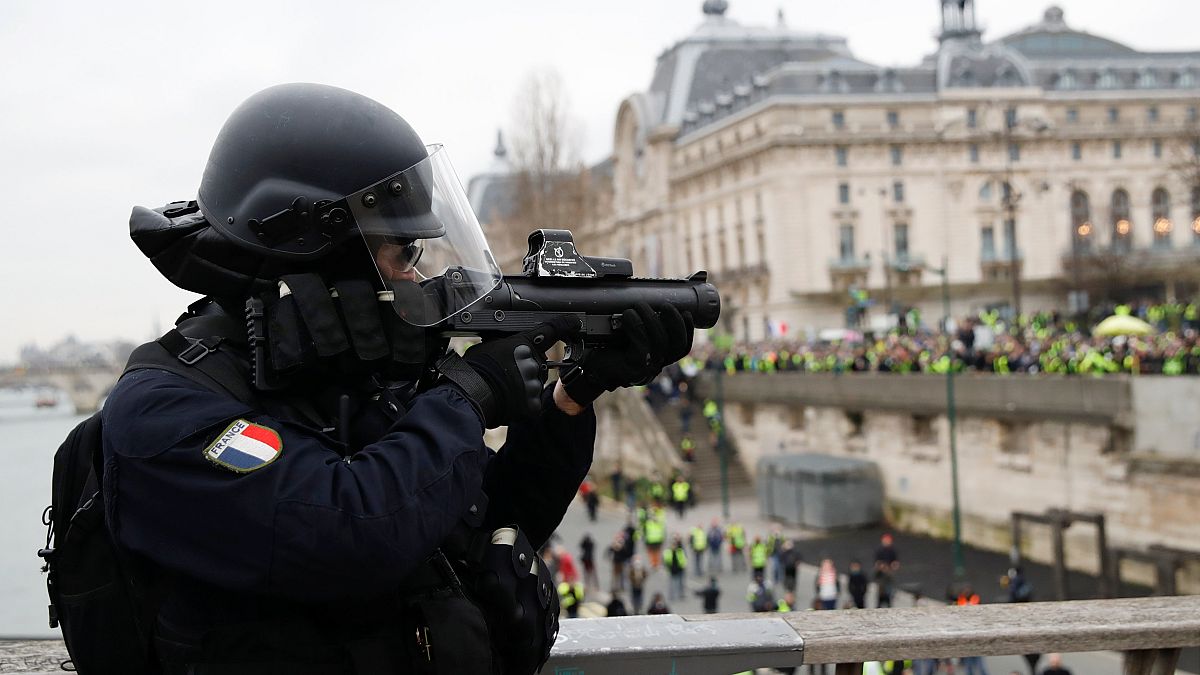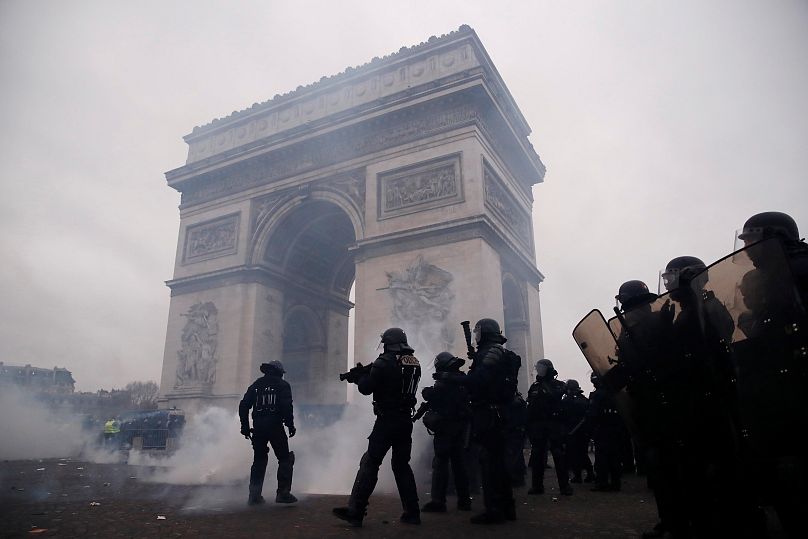Protesters have been left with serious injuries after being shot at with a LBD40 — a weapon described as "non-lethal" that fires 40-mm rubber balls.
Dozens of serious injuries caused by Flash Ball riot control guns, used by French police during gilets jaunes (yellow vests) protests, have sparked a debate over whether such weapons should be banned.
The country's top police officer, Eric Morvan, wrote to his staff this week ahead of more protests expected at the weekend, reminding them when and how the weapons can be used.
However, France's human rights chief, Jacques Toubon, has backed a ban.
About 2,000 protesters, as well as 1,000 law enforcement officers, have been hurt since the beginning of the movement in mid-November, according to the government.
One protester lost an eye, another went into a coma, while others ended up with fractured jaws.
Police use the "LBD40", a weapon described as non-lethal, which projects 40-mm semi-rigid rubber balls. Pellets travel at a speed of 100m/s and are meant to distort upon impact, thus not breaking the skin.
Serious injuries
On December 12, Jean-Marc Michaud, a 41-year-old horticulturist, was hit on the right side of his face by one of the rubber balls. He is now blind in his right eye.
"If the police blamed me for something, all they had to do was shoot me in the legs to immobilise me and stop me," he said.
A former paratrooper, Michaud, recalled how 20 years ago he had marched down the Champs-Elysées "with pride" for his country during the annual July 14 military parade. Now the famed avenue is where "LBD shots hurt innocent people every Saturday," he said.
"I don't know how I will pay for my reconstructive surgeries and I'm no longer proud of France," he added.
A police source told AFP that at least five protesters were seriously injured on December 12, "in all likelihood" by riot control guns.
Last Saturday, Olivier Beziade, a volunteer firefighter, taking part in a gilets jaunes protest in the south-western city of Bordeaux was shot in the head and collapsed. He was in a coma for six days.
According to the group "Desarmons-les" (Let's disarm then), at least 15 people have been partially blinded and "several hundred" were left with injuries including "open fractures to the face and cranial trauma" since the beginning of the protests.
'A scary weapon'
In a note to staff on Tuesday, France's police chief, Eric Morvan, said the use of the LBD40 during gilets jaunes protests was justified.
He said the weapon should be used in case of "mobs" or "in the case of violence or assault committed against the police or if they can not otherwise defend the land they occupy."
"These circumstances correspond to the urban riots that the police are currently facing," he explained, adding that the LBD "may be an appropriate response to deter or neutralize a violent and/or dangerous person."
An officer testimony included in the note read: "We face glass bottles, concrete blocks, acid, nuts and bolts. The LBD is a scary weapon. If they're taken away from us, no more colleagues will want to work at demonstrations."
Still, Morvan did remind his officers that the weapon may only be used following the principles of "necessity and proportionality" as well as "operational conditions" including respecting "distance intervals specific to each ammunition."
"The shooter must exclusively aim for the torso and upper or lower limbs" and "after shooting, in the case of arrest and as soon as the operational environment allows it, it is necessary to check on the person's health and have them taken care of medically if their health warrants it," he added.
Since the beginning of the gilets jaunes movement, the IGNG — known as the police force for the police — has received over 200 reports of police violence.
'Defense balls could present a great danger'
The country's human rights chief, Jacques Toubon, called for the weapon to be banned on Thursday.
"We have determined, from the cases submitted to us, that indeed the use of flashballs, the use of the launchers of 40-46 defense balls could present a great danger," Toubon told the RTL radio.
"I hope that in the face of the evidence we have given, the danger presented by these weapons used by intermediate forces, the government will make provisions," he added.

